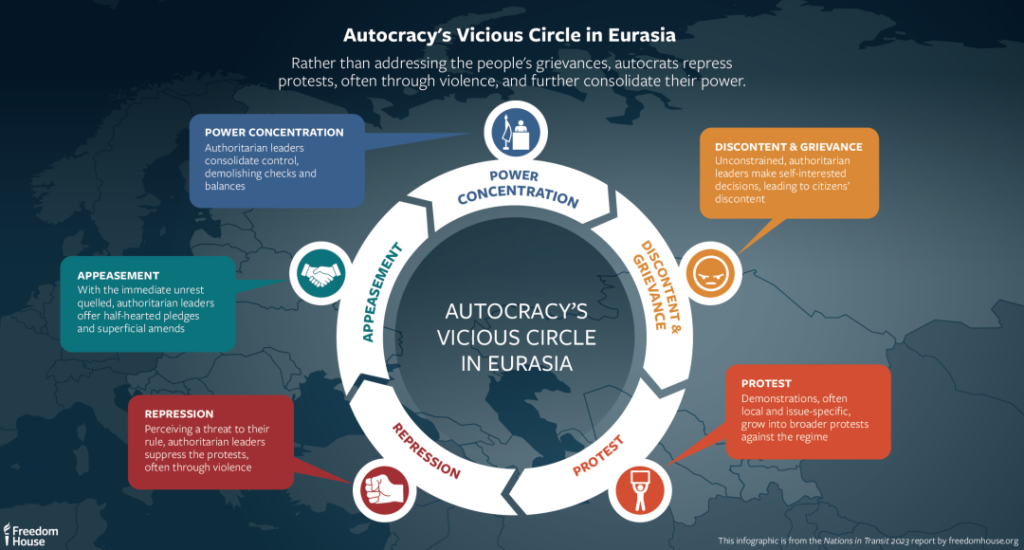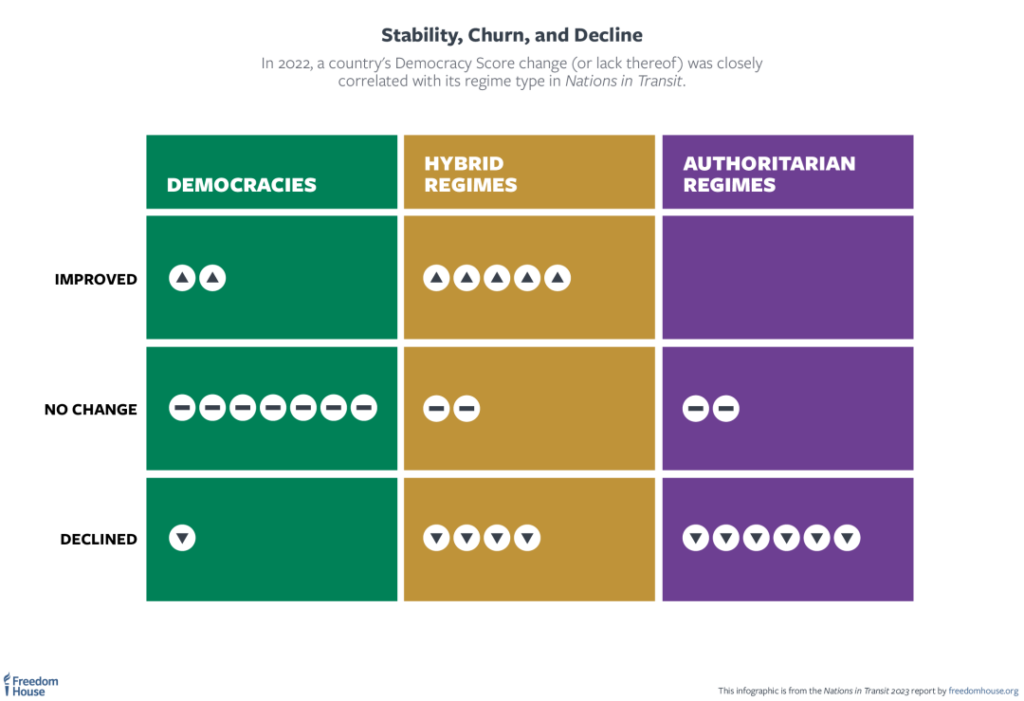 Democracy deteriorated in the 29-state region stretching from Central Europe to Central Asia in 2022, according to the latest Nations in Transit report from Freedom House. Russia’s invasion of Ukraine is at least partly to blame for the decline, which means that democracy has been sinking for 19 consecutive years in the region.
Democracy deteriorated in the 29-state region stretching from Central Europe to Central Asia in 2022, according to the latest Nations in Transit report from Freedom House. Russia’s invasion of Ukraine is at least partly to blame for the decline, which means that democracy has been sinking for 19 consecutive years in the region.
“Vladimir Putin’s brutal, unprovoked war of conquest in Ukraine has seriously endangered democratization efforts and widened political fissures in the surrounding area,” said Michael J. Abramowitz, president of Freedom House. “Only a sustained push for democratic progress across Central and Eastern Europe and Eurasia will reverse the damage of the past two decades and deliver a free and prosperous future for this region.”
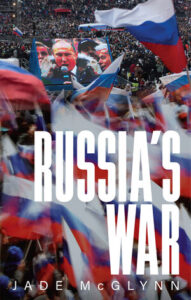 Russia itself suffered its largest single-year score decline in the history of the report due to a dramatic wave of repression aimed at domestic antiwar speech, according to Nations in Transit 2023: War Deepens a Regional Divide. The Kremlin’s actions in Ukraine represent the gravest challenge to peace, freedom, and democracy in Europe since the end of the Cold War, it adds.
Russia itself suffered its largest single-year score decline in the history of the report due to a dramatic wave of repression aimed at domestic antiwar speech, according to Nations in Transit 2023: War Deepens a Regional Divide. The Kremlin’s actions in Ukraine represent the gravest challenge to peace, freedom, and democracy in Europe since the end of the Cold War, it adds.
“The region’s autocracies have steadily abandoned or crushed the various features—a degree of autonomy for local governments, a tiny corps of independent journalists or civic activists, a genuine if hemmed-in opposition party, or space for limited dissent within the ruling elite—that had previously mitigated the excesses of absolute power,” the report adds. “The result, of course, has been a series of disastrous policy decisions that have taken citizens’ lives and threatened some of these countries’ survival.”
In 2023, democracy scores declined in 11 out of the 29 countries in the report, and 7 countries earned improvements, the report adds. Yet civic activists and democratic leaders continued to strive for better governance across the diverse region.
 “We saw a lot of optimistic analysis that Ukraine’s brave defense and resilience would really bolster the democratic sails in this region. And we have seen European solidarity by and large for Ukraine’s defense,” says Mike Smeltzer, a senior research analyst at Freedom House and author of the “Nations in Transit” report. “But it hasn’t undone the democratic deterioration in the region that we’ve seen up to this point.”
“We saw a lot of optimistic analysis that Ukraine’s brave defense and resilience would really bolster the democratic sails in this region. And we have seen European solidarity by and large for Ukraine’s defense,” says Mike Smeltzer, a senior research analyst at Freedom House and author of the “Nations in Transit” report. “But it hasn’t undone the democratic deterioration in the region that we’ve seen up to this point.”
The 10 non-EU countries that are rated as Hybrid Regimes—positioned in the grey zone between democracy and autocracy—received more Democracy Score improvements than declines in 2022, the report observes. At the same time, drawn-out EU accession processes in the Western Balkans reinforced disillusionment with the union and sapped its power to stoke reform. The challenges associated with accession only increased with the addition of Bosnia and Herzegovina, Moldova, and Ukraine as formal candidates for EU membership.
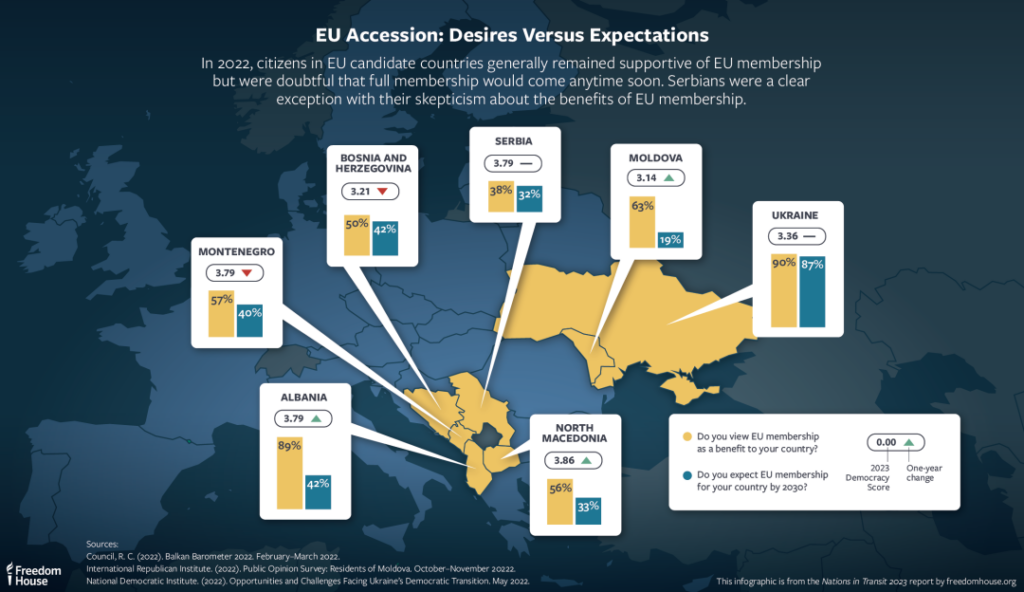
Key Findings
- For the 19th consecutive year, democratic governance suffered an overall decline in the region stretching from Central Europe to Central Asia. As Moscow pursued its full-scale invasion of Ukraine, autocrats persisted in their domestic assault on the remaining vestiges of institutional independence in the media, local governance, and especially civil society. Democracy Scores declined in 11 out of the 29 countries in the report, and 7 countries earned improvements. Yet civic activists and democratic leaders continued to strive for better governance across the diverse region.
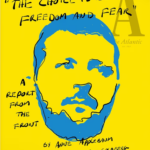 Democratic institutions stood strong in Ukraine but collapsed further in Russia. Ukraine’s government and people confirmed their commitment to liberal democracy in the face of unimaginable violence, while the Russian government intensified its repression of dissent at home. Nations in Transit 2023 documents the largest single-year drop in Russia’s score in the history of the report: there were declines on five out of seven thematic indicators, and the country’s overall Democracy Score—an average of the seven indicators—fell from 1.32 to 1.11 on a scale of 1 to 7.
Democratic institutions stood strong in Ukraine but collapsed further in Russia. Ukraine’s government and people confirmed their commitment to liberal democracy in the face of unimaginable violence, while the Russian government intensified its repression of dissent at home. Nations in Transit 2023 documents the largest single-year drop in Russia’s score in the history of the report: there were declines on five out of seven thematic indicators, and the country’s overall Democracy Score—an average of the seven indicators—fell from 1.32 to 1.11 on a scale of 1 to 7.- On illiberal populism, European Union member states pursued diverging paths. Hungary’s ongoing autocratization—which drove an annual decline second only to Russia’s—and Poland’s updated illiberal agenda continued to challenge democratic standards in Europe. However, there were signs that the deterioration in Poland may be slowing, and voters’ repudiation of populist, illiberal leaders in Slovenia in 2022 and Czechia in 2023 served as a reminder of democracy’s inherent potential for self-correction.
- Autocracies remained trapped in a vicious circle of repression and instability. Of the eight countries classified as Consolidated Authoritarian Regimes, six suffered further declines in their already abysmal Democracy Scores. The Russian invasion of Ukraine, an Azerbaijani incursion into Armenia, and the violent suppression of protests in Central Asia illustrated the deadly consequences of authoritarian misrule. RTWT
